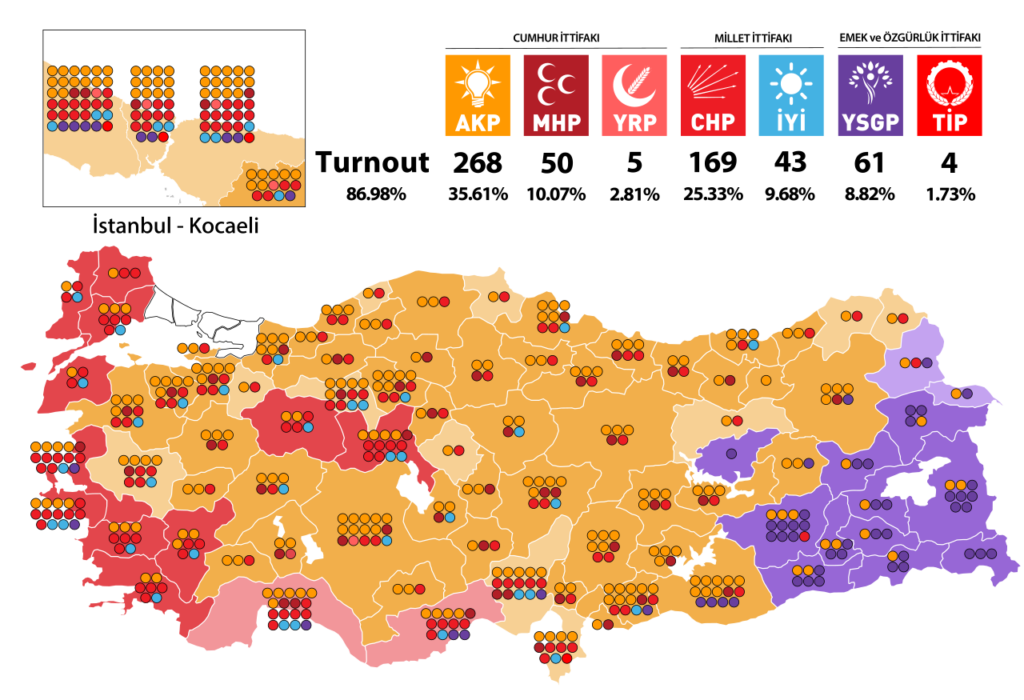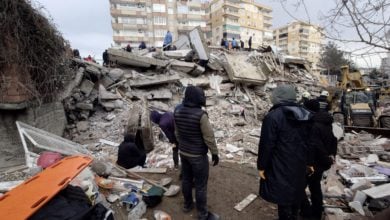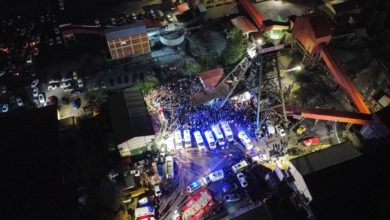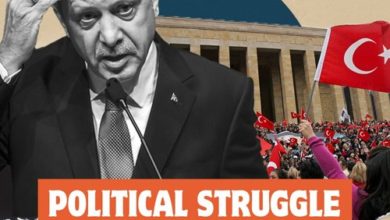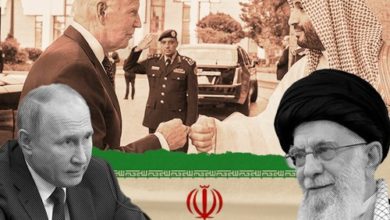Photo: Map of parliamentary election results. Credit: MapsandMP (Wikimedia Commons)
Millions went to polls on May 14 in Türkiye to cast their votes in the presidential and parliamentary elections. The turnout was a record high of 89%. According to the results, no presidential candidate was able to reach the 50% threshold needed to win the election in the first round, and and a second round run-off election is scheduled for May 28. That will see a contest between Tayyip Erdoğan, the current president and the candidate of the People’s Alliance led by the ruling Justice and Development Party (AKP), and Kemal Kılıçdaroğlu, the candidate of Nation’s Alliance led by the social democratic Republican People’s Party (CHP).
Ruling AKP-led coalition wins parliamentary majority
As far as the parliamentary votes go, the AKP-led People’s Alliance won a majority in the parliament, despite a significant decrease of almost 8% in the AKP’s own votes compared to the prior general elections held in 2018, when the AKP had received 42% of the votes. The AKP took 268 seats, while its junior partner Nationalist Movement Party (MHP) got 50 seats with 10% of the vote. On the opposition front, CHP got 25% of the vote and took 169 seats and its junior partner the Good Party (İYİP) got just shy of 10% of the vote and 43 seats. Note that 36 of the 169 seats CHP are distributed to the four right-wing parties that ran under CHP ballot as part the Nation’s alliance. The other opposition alliance, “Labor and Freedom Alliance,” led by the Kurdish movement, got around 10% of the vote and 65 seats.
People’s Alliance was formed by the ruling AKP and includes two fascist parties — Nationalist Movement Party (MHP) and Grand Unity Party (BBP) — and the ultraconservative, Islamist New Welfare Party (YRP). The alliance is also supported by other parties such as Hüda-Par, a Kurdish political Islamist party, although it did not officially join the alliance. YRP joined the alliance with a list of demands from AKP, including criminalization of adultery, voting on the annulment of the İstanbul Convention and abandoning regulations on gender equality. The İstanbul Convention is an international treaty against violence against women, which Türkiye was a signatory to until the AKP withdrew from it in 2021. Hüda-Par on the other hand is directly connected to the Kurdish Hezbollah organization, which is notorious in recent Türkiye’s history for its terror acts in connection with the counter-guerrilla operations against the progressive Kurdish movement. In essence, People’s Alliance is a congregation of the most reactionary, Islamist and nationalist forces in Türkiye.
Social democrat-led coalition paves the way for more right-wing representation in parliament
The main opposition force facing the AKP-led People’s Alliance in the elections was the Nation Alliance. Initiated by the social democratic party, CHP, the Nation Alliance is composed of five other right-wing parties. This includes the nationalist İYİP and two breakaway parties from the ruling AKP — the Future Party (GP) and Democracy and Progress Party (DEVA). The Islamist Felicity Party (SP) and Democrat Party (DP) also joined the alliance. The leaders of the GP and DEVA were both ministers of past AKP governments. Ahmet Davutoğlu, the leader of the GP, served as the Minister of Foreign Affairs for the AKP from 2009 and 2014 and is the main architect behind AKP’s criminal policy against Syria as they funded and armed ultra-reactionary Islamist terror groups in the drive to overthrow the government. The Islamist Felicity Party’s leader Karamollaoğlu claims the 1993 mass killing of progressive leaders by religious zealots in Sivas “was not a massacre.”
In essence, the Nation Alliance is a right-wing coalition despite being led by the social democratic party CHP. An avid NATO supporter, this alliance also made it an explicit point in their electoral campaign that if they came to power, they would normalize Türkiye’s relations with NATO members and the EU, including lifting Türkiye’s veto for Sweden’s NATO membership.
Another alliance that participated in both elections was the “Labor and Freedom Alliance,” led by the main Kurdish opposition party Peoples’ Democracy Party (HDP) and other progressive forces including the Workers’ Party of Türkiye (TİP). HDP decided to run under the lists of Green Left Party (YSGP) as HDP was facing a possible legal case against it that threatens to ban the party. Labor and Freedom Alliance supported Kemal Kılıçdaroğlu of the Nation Alliance for the presidency. In the parliamentary elections, this alliance got around 9% of the vote, mainly through votes in the southeast of Türkiye with a majority Kurdish population.
Sinan Oğan, running as an ultra-nationalist candidate with an anti-refugee platform that promised to send all refugees from Syria back, won a small but decisive 5% share of presidential votes. This will influence the dynamics significantly in the run-off and it is becoming clear that the CHP will shift its messaging further to the right in order to cut a deal with Sinan Oğan and gain the support of his voters. On May 18, Kılıçdaroğlu argued that Erdoğan, “did not protect [Türkiye’s] borders and honor” and therefore “as soon as I come to power, I will send all refugees home. Period.”
Only path to liberation: defense of secularism, exit from NATO, struggle against capitalist bosses
The Communist Party of Türkiye (TKP) and several other revolutionary forces also ran in the elections under the banner of the “Union of Socialist Forces,” standing on three main points: the defense of secularism, anti-imperialism that demands Türkiye’s exit from NATO for true national independence, and a militant defense of the interests of the working class against the capitalist bosses. In the presidential elections, TKP asked for a vote for CHP’s candidate Kılıçdaroğlu, not because they lent any political support to CHP, but for the defeat of Erdoğan stating that:
In order for communism, which is the only liberation for Turkey, to become a strong option and for a republican, enlightened and patriotic awakening to come to the fore in our country, the Erdoğan era must come to an end as soon as possible.
The put an end to the Erdoğan era has also become imperative so that people can realize that the Nation Alliance, which they perceive as the solution today, will only lead to a deepening of their problems rather than a liberation.
Observing the election results, the Communist Party of Türkiye concluded: “Defeating the AKP by imitating it was a great illusion and deceiving the public. The formation called the Nation Alliance is the subject of this state of illusion and the effort to deceive the public.”
Despite all the poverty, injustice, and the recent and massive destruction caused by the earthquake, large segments of people supporting the ruling party did not shift their support. Such change in the masses required a deeper political intervention that would include defense of secularism, anti-imperialism and questioning the deep inequality caused by the unfettered market economy and ruthless privatization of all public resources. The emergence of such a political intervention was essentially prevented by the Nation Alliance as they created the illusion that the deep problems in Türkiye — from extreme levels of poverty to the erosion of women’s rights, the institutionalization of religion in the political and social fabric of the society and the destruction of secularism — can be eliminated within the existing social order. This illusion was also shared by the HDP-led coalition “Labor and Freedom Alliance.”
The result is a parliamentary picture in which AKP, its splinter reactionaries, rightwingers, fascists, misogynists and religious zealots constitute the majority. It is a huge irony that the social democratic CHP, — as the founding party of the Republic which stood on secularism, independence and a progressive social order in 1923 — paved the way 100 years later for the emergence of the most right-wing parliament in the history of Türkiye.
The result that emerged on the night of May 14 shows that challenging days are ahead for all the people of Türkiye, but it is also clear that very large sectors of the population cannot be cornered into a false choice between two competing right-wing programs by the People’s and Nation Alliances or any force that cannot stand against capitalist bosses, against NATO and imperialism. The work falls on the shoulders of workers, women, youth and millions of people struggling with poverty to organize and escalate the struggle against all forces of capitalism. That will only happen through organization, determination and active struggle — not simply through the ballot box. The words of the latest TKP statement also clearly reflect this:
“Our people’s dreams, hopes, and belief in better days to come are greater than the outcome of the ballot box. However, if Erdoğan is going to be buried in the ballot box in this country, it will be us workers, not the Nation Alliance that does that …
Millions struggling with poverty and worrying about their future and their country, those who support secularism, and equality, and those from whom this order has stolen so much, they will will stand up and complete the job that the shortsighted opposition failed to do.”


